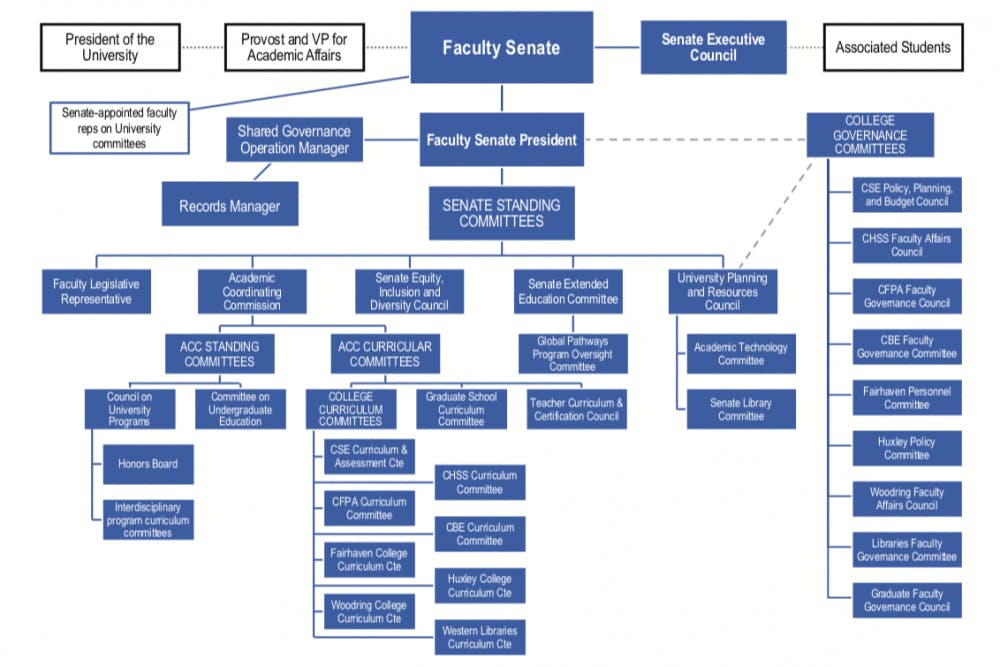Faculty Senate approved a new seat at the Academic Coordinating Commission

By Ryan Morris
Which colleges have a say in curricular decisions? This is the question faculty asked when requesting a graduate seat on the Academic Coordinating Commission.
On Oct. 19, the Faculty Senate approved a graduate seat on the Academic Coordinating Commission for the first time. The vote was 22 in favor and one opposed.
Until 2019, the graduate programs at Western were represented by a curriculum committee under the Academic Coordinating Commission, known as the Graduate Council. The first faculty member to serve as chair of the Graduate Council was Craig Dunn, a wilder distinguished professor of business and sustainability.
While the graduate college is different from other colleges on campus, it still needs the representation other colleges have, Dunn said.
Chair of the Academic Coordinating Commission Brooke Love described the graduate college as different because it is not as clearly defined as the other colleges. Other colleges don’t overlap with each other the way the graduate college does, with some professors working in both the graduate college and other colleges.
“It’s not an entity that’s a standalone. It is interwoven with all of the other colleges,” Love said. “You can’t put a box around it like you can [with the other colleges].”
Despite this unique structure, Dunn said it’s critical for the graduate college to have representation on the Academic Coordinating Commission. Faculty who teach graduate courses
make up the majority of the Academic Coordinating Commission, faculty pointed out at the Faculty Senate meeting. Dunn confirmed that this is the case but argued this new seat guarantees there is discussion about graduate needs in all conversations.
Having a representative at the Academic Coordinating Commission gives graduate faculty more efficient access to curriculum decisions, professor Bob Mitchell explained.
Dunn said he, along with a group of other faculty, had to first create the Graduate Faculty Governance Council. The Graduate Faculty Governance Council allows the graduate college to have a committee equal to other colleges’ under the college governance committees, according to the Faculty Governance Organization Structure. This council and a seat at the Academic Coordinating Commission recognized the graduate college as its own college for the first time, Dunn said.
“This [new seat] means we have representation, and we have a voice. We have somebody who can really think about the unique situation graduate students are in at Western, and who can really be an advocate and a voice for them in curricular decisions,” professor Ruth Sofield said.
One example of a policy tailored to graduate students is grading. When COVID-19 put Western classes online, the Academic Coordinating Commission decided to use pass/no pass grading as the default, Dunn explained. The graduate college was later informed of this, disagreed and kept the graduate grading to a letter scale default, Dunn said.
“There was not adequate consideration — in fact I don’t think any consideration was given to the fact that [that policy] may work for undergraduate students but not for graduate students,” Dunn said.
Dunn said this didn’t fit the academic needs of graduate students and their need for a graduate level education to apply to future endeavors. He said having a graduate representative at the Academic Coordinating Commission would have streamlined this process.
Beyond having a seat at the table, Dunn said this will raise the graduate college’s visibility.
Victor Borden, professor of higher education and student affairs at Indiana University and the project director of Carnegie Classification of Institutions of Higher Education, explained the importance of having graduate voices represented in decision making. He said visibility allows graduate programs’ specific needs to be heard at undergraduate-heavy universities.
Borden said this proves important to attract faculty to Western as well. He said graduate faculty are often attracted to universities with large research programs and well-represented graduate colleges.
Dunn and Sofield echoed this idea. They said many faculty would not be at Western without the work of the graduate program and graduate students.
There will be student representation on the Graduate School Curriculum Committee, Sofield said. According to the Graduate Faculty Governance Council bylaws, they will appoint a graduate student to one voting seat this month.
Sofield said the Graduate School Curriculum Committee has yet to pick a faculty member to serve on the Academic Coordinating Commission.
“There are [decisions being made] that demand there be someone in the room who is paying attention to graduate students’ interests,” Dunn said.





